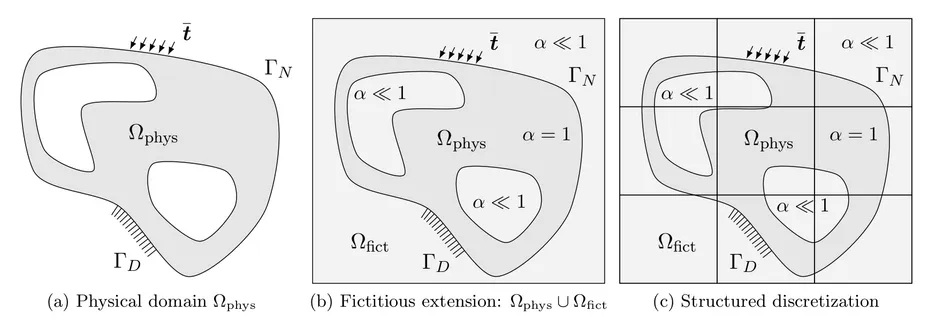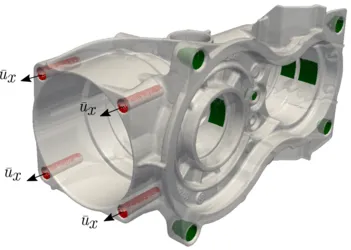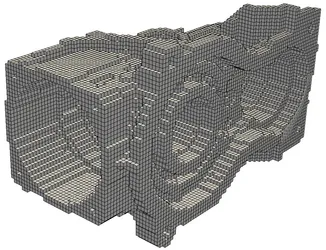Efficient Parallel Computations for the Finite Cell Method
Team Members: John Jomo, Stefan Kollmannsberger, Ernst Rank
Funding: KONWIHR
Duration: 11.2017-01.2019; 01.2020-12.2020
Motivation
High performance computing is an increasingly relevant field in computational mechanics for the solution of partial differential equations with many unknowns. This project seeks to develop efficient algorithms and data structures for the solution of complex real-life engineering problems by utilizing the finite cell method, hp-refinement, iterative solution strategies and the computational power of state-of-the-art parallel computing architectures.
The finite cell method and hp-refinement

The finite cell method (FCM) is a high-order fictitious domain approach that simplifies the process of mesh generation for bodies with complex geometries [1]. A body with a complex geometry is immersed in a simple domain that is then discretized using regular elements. These elements lie either completely within the original complex geometry or are intersected by the boundary of the original body, in which case they are referred to as "cut cells". The approximation capabilities of an FCM-discretization can be further improved by the use of hp-refinement, see e.g. [2].
Figure 2 shows an aluminum gearbox housing, an example of a mechanical component with a complex geometry. The geometry of the specimen is obtained from a high-resolution micro-CT scan. A finite cell mesh can be generated directly from the scan, hereby reducing the computational cost of meshing such a structure.


Conditioning problems related to FCM
For a long time FCM simulations have been restricted to the use of direct solvers due to ill-conditioning caused by the cut cells. Recent developments in preconditioning techniques for FCM, e.g. [3], have opened the door for the use of iterative solvers in FCM simulations. The current project builds on [3] and develops Additive Schwarz-type preconditioners that can be applied to FCM discretizations with multi-level hp-refinement [4]. Additive Schwarz preconditioners resolve the conditioning problems associated with badly cut cells and lead to faster convergence, see Fig. 5.
Parallel computations with FCM
FCM computations on complex geometries like the gearbox housing depicted in Figure 2 can be accelerated by the use of parallel Computing. In particular a hybrid parallelization approach employing MPI and OpenMP can be applied to the simulation pipeline. Elements in the computational domain are hereby partitioned into sub-domains and the sub-domains assigned to distinct MPI processes. Each MPI process is responsible for evaluating the physics on its respective sub-domain and collectively solving the global system of equations with the other participating processes. Current research is focused on the developement of agile data structures with minimal storage and communication requirements as well as robust parallel iterative solvers.
References
- A. Düster, J. Parvizian, Z. Yang, E. Rank. The finite cell method for three-dimensional problems of solid mechanics. Comput. Methods Appl. Mech. Eng., 197(45-48):3768–3782, 2008.
- N. Zander, T. Bog, S. Kollmannsberger, D. Schillinger and E. Rank, Multi-level hp-adaptivity: high-order mesh adaptivity without the difficulties of constraining hanging nodes Comput Mech, vol 55, pp. 499-517, 2015.
- F. de Prenter, C. V. Verhoosel, G. J. van Zwieten, and E. H. van Brummelen, Condition number analysis and preconditioning of the finite cell method, Comput. Methods Appl. Mech. Eng., 2016.
- J. Jomo, F. de Prenter, E. Mohamed, D. D'Angella, C.V. Verhoosel, S. Kollmannsberger, J. Kirschke, V. Nübel, E.H. van Brummelen and E. Rank, Robust and parallel scalable iterative solutions for large-scale finite cell analyses, arxiv arXiv:1809.00828, preprint submitted to Finite Elements in Analysis and Design.